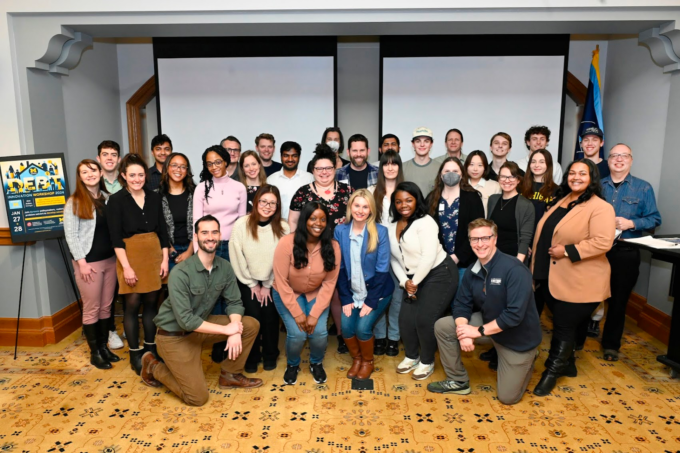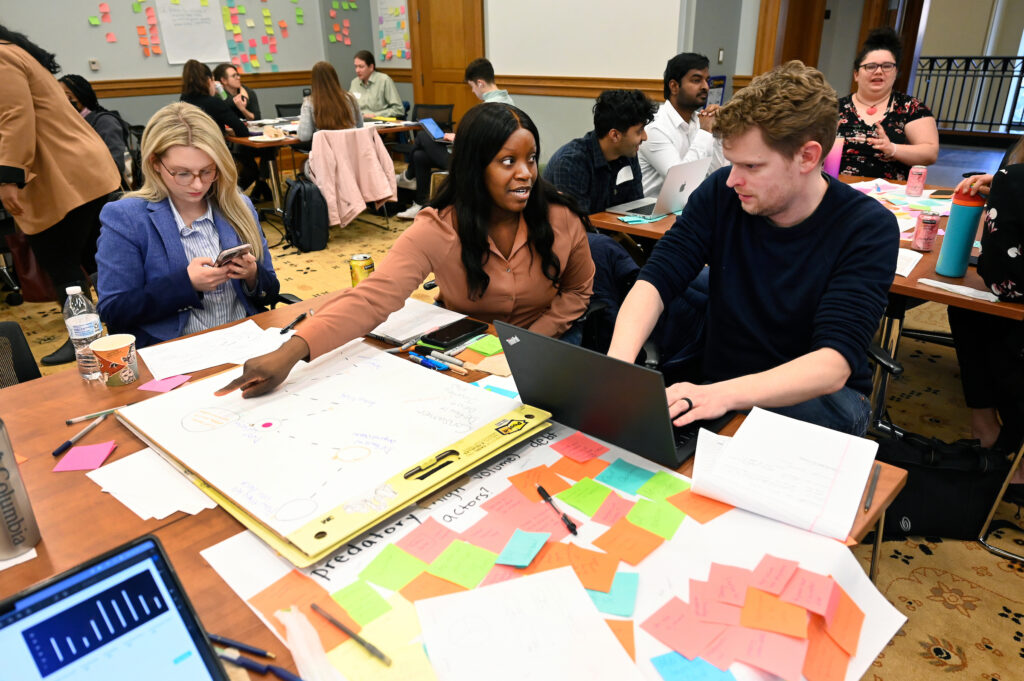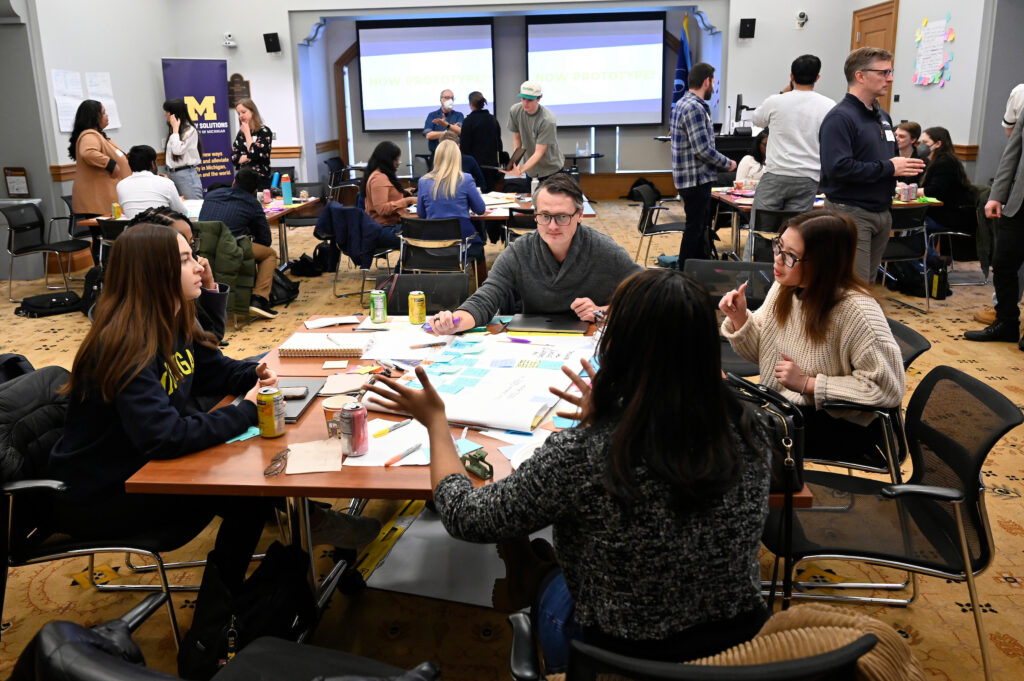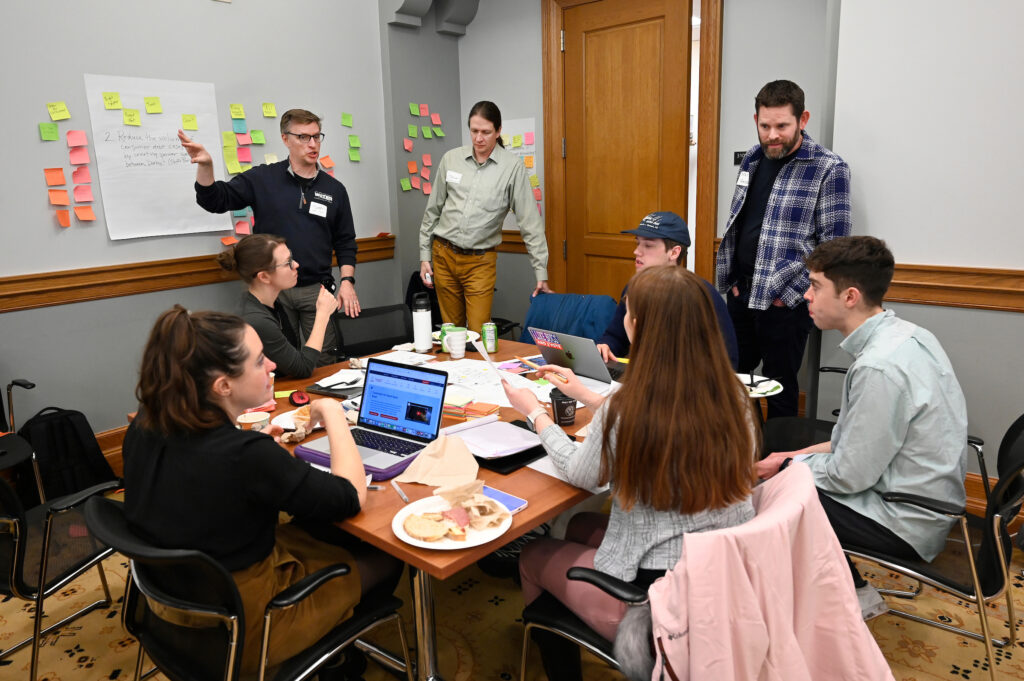Poverty Solutions workshop generates novel solutions for addressing Michigan’s debt collection crisis

Participants gather at the Innovation Workshop 2024: Debt hosted by Poverty Solutions and held Jan. 27-28, 2024, at the U-M School of Information. Photo by Jose Juarez | Michigan Photography
Contact: Malcolm Phelan, 484-587-0094, mtphelan@umich.edu
ANN ARBOR – This past weekend at “Innovation Workshop 2024: Debt,” more than 50 lawyers, policymakers, students, and coders from around the country convened over two days to tackle the pressing issue of debt collection and its impact on Michigan’s families and legal system. Teams, led through a design-thinking framework, developed over 20 new approaches for reining in predatory debt collection, lessening the barrage of filings on local court systems, and providing information and resources to low-income Michiganders facing debt-related lawsuits.
Participants designed and prototyped ideas including an online “chat-bot” that would provide automated texts to defendants alerting them about critical court dates and offering referrals to legal aid organizations. Another concept was a computer application for court systems that could scan filings from debt collectors to ensure that the debt was legally owed. Many more concepts were designed and will continue to be explored by participants and participating organizations.

Participants gather at the Innovation Workshop 2024: Debt hosted by Poverty Solutions and held Jan. 27-28, 2024, at the U-M School of Information. Photo by Jose Juarez | Michigan Photography
Matt Andres, clinical professor of law at University of Michigan and chair of the Justice for All Commission Debt Collection Working Group, said: “Over 200,000 debt collection cases are filed in Michigan courts annually, and most of them result in a judgment for the creditor without a hearing ever taking place. Experts in Michigan and throughout the country have done some great work in the last few years on improving the fairness and legitimacy of how debt is collected through the courts. The Innovation Workshop brought many of those experts together in the same room with smart, creative students from a variety of disciplines in a well-structured problem-solving process. The out-of-the-box thinking the workshop encouraged yielded innovative ideas for products and policies that could be game changers for Michiganders facing the harsh consequences of debt.”
The event was hosted by U-M’s Poverty Solutions initiative. Trevor Bechtel, strategic projects manager at Poverty Solutions, said: “Poverty is a set of interlinking systems that don’t work for people facing economic insecurity. Debt can be one of the most challenging and pernicious barriers to prosperity, so we were delighted to see the ideas and energy generated by this event around this critical issue.”
Malcolm Phelan, the Michigan Law student who organized the event, said: “It was inspiring to see so many students and professionals excited to spend a full weekend working together to address the critical issue of debt collection in Michigan. The goal was to bring together practitioners who have spent decades working on these issues with coders, designers, and policy researchers who could bring new technologies and ideas to the effort. Based on the thoughtful and innovative solutions that were produced, the event was a resounding success.”

Participants gather at the Innovation Workshop 2024: Debt hosted by Poverty Solutions and held Jan. 27-28, 2024, at the U-M School of Information. Photo by Jose Juarez | Michigan Photography
The event was facilitated by Scott TenBrink, assistant director of civic engagement and lecturer at U-M’s School of Information, and Bridgette Carr, clinical professor of law at Michigan Law School. Presenters and participants included Justice Elizabeth Welch, former Chief Justice of the Michigan Supreme Court Bridget McCormack, Washtenaw County Prosecutor Eli Savit, state Sen. Jeff Irwin, as well as participants from national organizations such as the Aspen Institute, the Pew Foundation, the Legal Services Corporation, the American Arbitration Association, and the Princeton Debt Collection Lab. Michigan organizations included Detroit Justice Center, Michigan Poverty Law Program, and Legal Services of South Central Michigan. Student participants joined from U-M Schools of Law, Public Policy, Social Work, and Computer Science and Engineering as well as Michigan State University College of Law and Georgetown Law School. The event was sponsored by Michigan State University’s Center for Law, Technology & Innovation, the American Arbitration Association, and U-M’s School of Information.

Participants gather at the Innovation Workshop 2024: Debt hosted by Poverty Solutions and held Jan. 27-28, 2024, at the U-M School of Information. Photo by Jose Juarez | Michigan Photography
